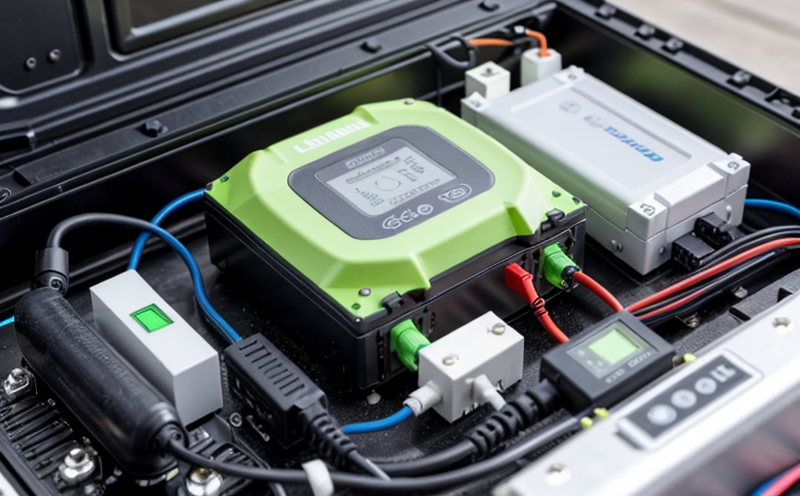ASTM E2395 Lithium-Ion Battery Testing under Extreme Environmental Conditions
The ASTM E2395 standard provides a robust framework for testing lithium-ion batteries in extreme environmental conditions. This service ensures that the performance and safety of these critical components meet stringent requirements set by international standards.
Lithium-ion batteries are widely used in various sectors including automotive, aerospace, consumer electronics, and renewable energy storage. The harsh operating environments encountered during their lifecycle demand thorough testing to ensure reliable performance and safety. ASTM E2395 focuses on the effects of temperature, humidity, pressure, and other environmental factors that can degrade battery performance.
The test protocol involves subjecting batteries to a series of extreme conditions designed to mimic real-world scenarios. This includes cold chamber tests at -40°C, high-temperature exposure up to 85°C, and humidity levels exceeding 93%. The testing process is conducted in a controlled environment that mimics the operational conditions under which the battery will be used.
Specimen preparation for ASTM E2395 involves careful selection of batteries representative of the intended use. These batteries are then subjected to a series of tests, including charge-discharge cycles, capacity retention measurement, and impedance analysis. The testing apparatus includes specialized chambers capable of maintaining precise temperature, humidity, and pressure levels.
The acceptance criteria for ASTM E2395 are stringent. Batteries must demonstrate consistent performance across all test conditions without compromising safety or integrity. This ensures that the batteries can withstand extreme environmental challenges while maintaining their operational efficiency.
Real-world applications of this testing include quality assurance in manufacturing, ensuring compliance with regulatory requirements, and supporting research and development efforts to enhance battery technology. By adhering to ASTM E2395 standards, manufacturers can confidently deploy lithium-ion batteries that are reliable and safe under all conditions.
Applied Standards
| Standard Name | Description |
|---|---|
| ASTM E2395 | This standard specifies the procedure for testing lithium-ion batteries under extreme environmental conditions, including temperature, humidity, and pressure variations. |
| IEC 62133 | A set of standards for battery chargers and battery pack safety requirements to ensure that the products are safe and reliable in various environments. |
In addition to ASTM E2395, IEC 62133 is often used alongside this testing service. Together, these standards provide a comprehensive approach to ensuring battery safety and reliability under extreme conditions.
Why Choose This Test
Choosing ASTM E2395 lithium-ion battery testing ensures that your products meet the highest industry standards for performance and safety. This service is crucial for manufacturers looking to ensure their batteries can withstand extreme environmental conditions without compromising on reliability or safety.
The test provides detailed insights into how batteries will behave in real-world scenarios, helping you make informed decisions about design improvements and quality control measures. By adhering to these stringent tests, you demonstrate your commitment to delivering high-quality products that meet regulatory requirements and customer expectations.
This testing service also supports continuous improvement in battery technology. Through regular testing, manufacturers can identify areas for enhancement and implement necessary changes to enhance product performance. This proactive approach not only enhances brand reputation but also ensures long-term market success.
Furthermore, compliance with ASTM E2395 is often a prerequisite for regulatory approval in many countries. By choosing this test, you ensure that your products are ready for deployment in any global market. The comprehensive nature of the testing process provides peace of mind, knowing that your batteries will perform consistently under all conditions.
International Acceptance and Recognition
The ASTM E2395 standard is widely recognized and accepted by regulatory bodies across the globe. This ensures a consistent approach to testing lithium-ion batteries, which is crucial for manufacturers operating in multiple jurisdictions.
A number of countries have adopted or are in the process of adopting standards like ASTM E2395 as part of their national regulations. For instance, European Union directives and U.S. federal guidelines often reference these international standards to ensure product safety and reliability.
The acceptance of ASTM E2395 is also reflected in its use by leading manufacturers and research institutions worldwide. This widespread adoption underscores the importance and reliability of this testing methodology. By adhering to ASTM E2395, you not only meet global standards but also align with best practices recognized by industry leaders.
The recognition of ASTM E2395 extends beyond compliance requirements; it is a benchmark for quality that enhances brand reputation and customer trust. This standardization ensures that your products are consistently reliable, safe, and performant across different environments, thereby fostering long-term relationships with customers and suppliers.





